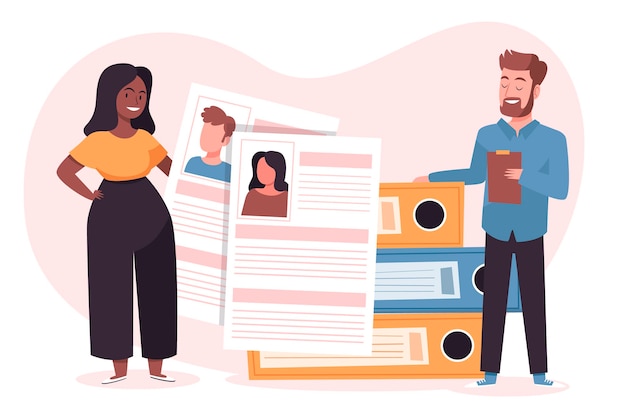Avoid Resume Mistakes: 2025 Update for US Job Seekers

Avoid These Common Resume Mistakes: A 2025 Update for US Job Seekers highlights crucial errors in resume writing for US job applicants, providing actionable advice to enhance your resume and increase your chances of landing an interview.
Your resume is your first impression. In today’s competitive job market, it’s crucial to ensure it’s a great one. Let’s dive into how to avoid these common resume mistakes: A 2025 update for US job seekers.
Why Avoiding Resume Mistakes Matters
In today’s job market, recruiters are often sifting through hundreds of resumes for a single position. Making a strong first impression is crucial, and your resume is your key tool in achieving this. A well-crafted resume can open doors to exciting career opportunities, while one filled with errors can lead to immediate rejection.
Understanding the common pitfalls in resume writing is the first step toward creating a resume that effectively showcases your skills and experience. By proactively addressing these issues, you can significantly increase your chances of securing an interview and advancing your career.
The Cost of a Poor Resume
A poorly written resume can have significant consequences. It can lead to missed opportunities, wasted time, and prolonged job searches. Recruiters may overlook your qualifications if your resume is difficult to read or contains errors. Here’s why it matters:
- Missed Opportunities: A weak resume may not even make it past the initial screening process, preventing you from being considered for jobs you’re qualified for.
- Wasted Time: Incorrect information or generic wording can frustrate recruiters, leading them to discard your application quickly.
- Negative Perception: Grammatical errors or unprofessional formatting can create a perception of carelessness or lack of attention to detail.
The Importance of Tailoring Your Resume
A common mistake is using a generic resume for every job application. Instead, tailor your resume to each specific position you’re applying for. Highlight the skills and experiences that are most relevant to the job requirements. By tailoring your resume, you demonstrate to the recruiter that you understand the job and have the qualifications they’re looking for.

Therefore, taking the time to refine your resume and avoid common mistakes is an investment in your career. It increases your chances of getting noticed and landing the job you deserve.
Typos and Grammatical Errors: The Silent Killers
One of the most damaging mistakes you can make on your resume is including typos and grammatical errors. These errors can immediately raise the recruiter’s eyebrows and signal a lack of attention to detail, severely hindering your chances of success. Don’t let something so easily avoidable be the reason you are passed over.
These mistakes, while seemingly small, can have a significant impact on your overall impression. They can suggest a lack of professionalism or carelessness, even if you possess all the necessary qualifications for the job.
Proofread Meticulously
Take the time to carefully proofread your resume multiple times. Look for typos, grammatical errors, and inconsistencies in formatting. It can be helpful to read your resume aloud or use a grammar-checking tool to catch any mistakes. Consider these strategies:
- Read Aloud: This helps you identify awkward phrasing and grammatical errors that you might miss when reading silently.
- Use Grammar Tools: Tools like Grammarly or the built-in spell checker in your word processor can catch many common mistakes.
- Ask a Friend: Fresh eyes can often spot errors that you’ve overlooked.
Common Grammar Mistakes to Avoid
Be aware of common grammatical mistakes that are frequently found on resumes. These include incorrect subject-verb agreement, misuse of homophones (e.g., “there,” “their,” and “they’re”), and improper punctuation. Here are some specific examples to consider:
- Subject-Verb Agreement: Ensure that your verbs agree with their subjects (e.g., “I am” instead of “I is”).
- Homophones: Use the correct form of words like “there,” “their,” and “they’re.”
- Punctuation: Pay attention to commas, semicolons, and apostrophes.
Ultimately, a polished resume demonstrates a commitment to excellence and professionalism. By eliminating typos and grammatical errors, you convey to employers that you care about the details and take pride in your work.
Avoid Generic Language and Clichés
Resumes packed with generic language and clichés often fail to impress recruiters. Instead of showcasing your unique skills and experiences, they blend into the background. To stand out, use specific language and quantifiable achievements to highlight the value you bring to the table.
Generic language is vague and doesn’t provide any concrete details about your accomplishments. Avoid using phrases like “team player” or “results-oriented” without backing them up with specific examples.
Examples of Clichés to Avoid
Certain phrases have become overused in resumes and should be avoided. Here are some common clichés to steer clear of:
- Team Player: Instead of saying you’re a team player, describe a specific situation where you collaborated effectively with others.
- Results-Oriented: Provide quantifiable results to demonstrate your ability to achieve goals.
- Hardworking: This is a subjective term. Instead, showcase your work ethic through specific examples of your accomplishments.
Use Action Verbs and Quantifiable Achievements
Replace generic language with action verbs and quantifiable achievements. Action verbs describe what you did, while quantifiable achievements demonstrate the impact of your work. Consider this approach:
- Instead of: “Responsible for managing social media accounts.”
- Try: “Managed social media accounts, increasing engagement by 30% and follower count by 20%.”

By using specific language and quantifiable achievements, you create a resume that showcases your unique value proposition and increases your chances of getting noticed.
Inconsistent Formatting and Design
A visually appealing resume is essential for capturing the attention of recruiters. Inconsistent formatting and poor design can make your resume difficult to read and detract from your qualifications. The formatting should be clean, consistent and easy to read.
Consistency in formatting is crucial for a polished and professional look. Use the same font, font size, and spacing throughout your resume. Avoid using multiple fonts or excessive colors, as this can create a cluttered appearance.
Key Formatting Tips
Follow these tips to ensure consistent formatting throughout your resume:
- Font: Choose a professional and easy-to-read font, such as Arial, Calibri, or Times New Roman.
- Font Size: Use a font size between 10 and 12 points for the body of your resume.
- Spacing: Use consistent spacing between sections and bullet points.
Design Elements That Enhance Readability
Use design elements to enhance the readability of your resume. Bold headings, bullet points, and strategic use of white space can help guide the recruiter’s eye and make your resume more visually appealing. Here are some common tips to follow:
- Bold Headings: Use bold headings to distinguish between different sections.
- Bullet Points: Use bullet points to highlight key accomplishments and responsibilities.
- White Space: Use white space to break up large blocks of text and create visual balance.
By paying attention to formatting and design, you can create a resume that is both visually appealing and easy to read, increasing your chances of making a positive impression.
Irrelevant Information and Lengthy Resumes
Recruiters often have limited time to review resumes. Including irrelevant information or creating a lengthy resume can overwhelm them and detract from your key qualifications. Keep them short, sweet and to the point.
Irrelevant information can include personal details, outdated job experience, or skills that are not relevant to the job you’re applying for. Including this information clutters your resume and distracts from your most important qualifications.
What to Exclude
Be sure to omit irrelevant details and create a concise, focused resume. Be sure to leave out any personal data such as age, race, religion, etc. When deciding what to leave off, consider excluding:
- Personal Details: Avoid including personal details such as your age, marital status, or religious affiliation.
- Outdated Experience: Focus on your most recent and relevant job experience.
- Unrelated Skills: Only include skills that are relevant to the job you’re applying for.
Conciseness and Clarity
A concise resume is easier for recruiters to review and allows them to focus on your key qualifications. Use clear and direct language, and avoid unnecessary jargon or technical terms. Be straightforward with your duties and responsibilities.
- Use Bullet Points: Bullet points can help you organize information and make it easy to read.
- Use Action Verbs: Action verbs can help you describe your accomplishments in a concise and impactful way.
- Keep it Brief: Aim for a one-page resume if you have less than 10 years of experience.
Lying or Exaggerating Your Qualifications
Maintaining honesty on your resume is arguably the most important thing. Lying or exaggerating your qualifications can have serious consequences. Misrepresenting your skills or experience can damage your reputation and lead to job loss if discovered. While it may be tempting to inflate your credentials, the risks far outweigh the potential benefits.
Exaggerating your qualifications can involve inflating your skills, experience, or accomplishments. For example, claiming proficiency in a software program that you only have basic knowledge of, or exaggerating your role in a project.
The Risks of Misrepresentation
Besides the ethical issues, there are serious consequences to embellishing your resume in any way. Some of these include:
- Damage to Reputation: If discovered, lying on your resume can damage your professional reputation and make it difficult to find future employment.
- Job Loss: If you’re hired based on false information, you could be fired if the employer discovers the misrepresentation.
- Legal Consequences: In some cases, lying on your resume could even have legal consequences.
Be Honest and Transparent
Focus on highlighting your genuine skills and accomplishments in an honest and transparent manner. It’s better to present yourself accurately and find a job that aligns with your qualifications.
- Focus on Strengths: Highlight your genuine strengths and accomplishments.
- Be Specific: Provide specific examples to demonstrate your skills and experience.
- Be Honest: Always be honest about your qualifications and experience.
Having an honest and accurate resume builds trust with employers and sets the foundation for a successful career. Honesty is indeed the best policy.
| Key Point | Brief Description |
|---|---|
| ✍️ Grammar | Ensure no typos/grammatical errors. Proofread! |
| 🎭 Generic Language | Use specific words and quantifiable achievements. |
| 🎨 Formatting | Keep formatting and design consistent, clean! |
| 🤥 Honesty | Be honest about skills. Honesty is key! |
Frequently Asked Questions
▼
Tailoring your resume shows recruiters you understand the specific job and possess relevant skills. It demonstrates a genuine interest and alignment with the company’s needs, increasing your chances of getting noticed.
▼
Proofread your resume multiple times, read it aloud, use grammar-checking tools, and ask a friend to review it. These steps help catch errors you might miss on your own, ensuring a polished and professional document.
▼
Avoid overused phrases like “team player,” “results-oriented,” and “hardworking.” Instead, provide specific examples and quantifiable achievements to demonstrate these qualities effectively, making your resume stand out.
▼
Aim for a one-page resume if you have less than 10 years of experience. For more extensive experience, a two-page resume may be appropriate. Focus on including only the most relevant and impactful information to keep it concise.
▼
No, lying or exaggerating your qualifications can have serious consequences, including damage to your reputation and job loss. Always be honest and transparent, focusing on highlighting your genuine skills and accomplishments.
Conclusion
By avoiding these common resume mistakes, you’ll significantly increase your chances of making a positive impression and securing an interview. Remember to tailor your resume, eliminate errors, use specific language, maintain consistent formatting, and always be honest about your qualifications. Wishing you the best on your job search!





